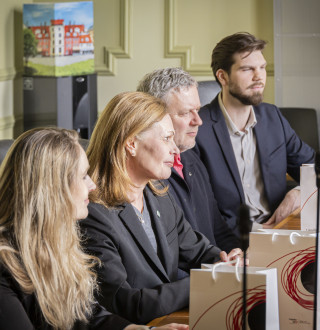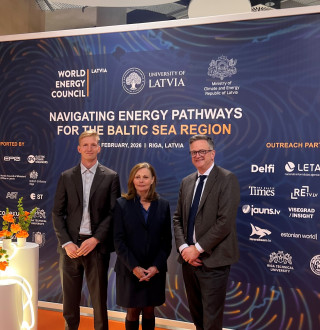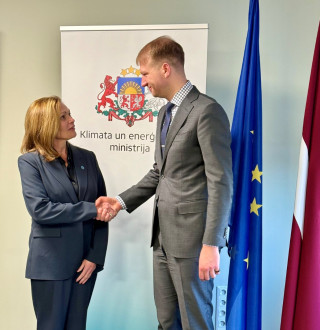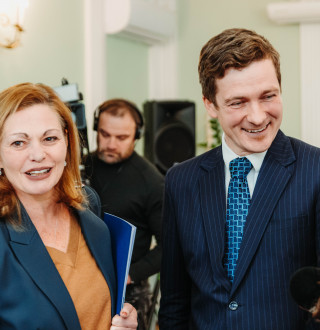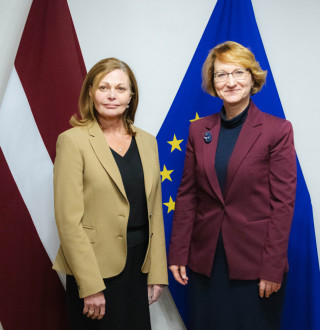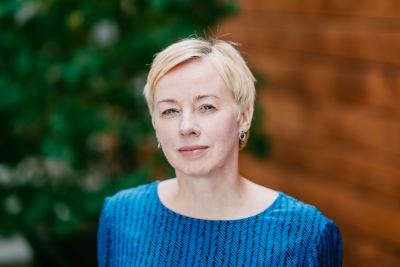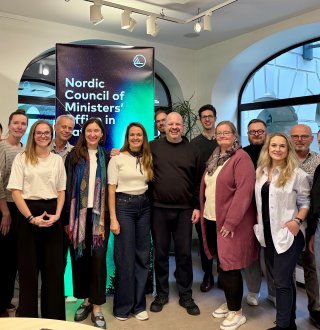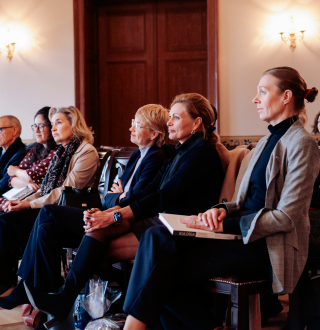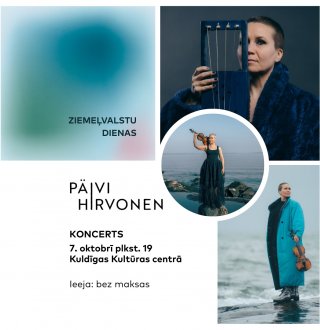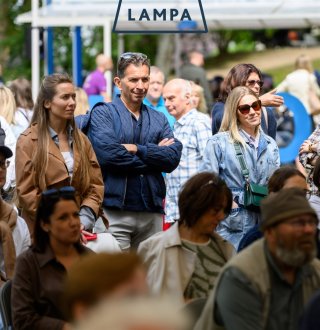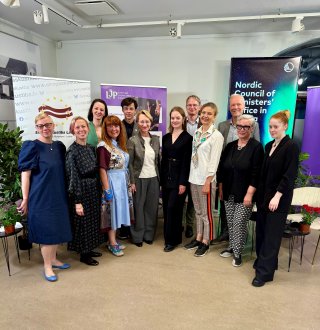The Nordic Council of Ministers' Office in Latvia, together with cooperation partners at democracy festival LAMPA 2019, will offer interesting topics for discussions and reflections and will bring to the festival several Nordic experts. Over two days there will be ten debates being held with the assistance of our partners:
The discussion ARTIFICIAL INTELLIGENCE – THE PERFECT JOURNALIST OR A DANGEROUS MANIPULATOR. Able to explore hundreds of sources and write an article in a matter of minutes. Is this science fiction or the near future? Recent years have seen the rapid development of computer technology that allows the handling of considerable amounts of data, and the leading media in the world are increasingly using artificial intelligence to create news articles. Artificial intelligence is able to not only create content but also check sources of information and the reliability of facts. However, sceptics warn us that algorithms are programmed by people, who are subject to prejudice or selfish intent, and therefore artificial intelligence can be used as a tool for spreading misinformation and discriminatory content. What is artificial intelligence capable of in the media world? The discussion will be moderated by Jānis Siksnis, Acting Executive Director of Baltic Centre for Media Excellence. In the discussion will participate Cristina Andersson from Finland, entrepreneur and a boardmember of Airawise OY, Alla Anohina-Naumeca, Associate professor, Riga Technical University, Konstantīns Kuzikovs, Сhairman of the Board at A/s Delfi and Arta Ģiga, TV and film producer (Red Dot Media).
28.06.2019 18:00 - 19:30 Stage Apgaismo - the discussion DIFFERENCE AS COMPETENCE: HOW TO UNLOCK DIVERSITY POTENTIAL IN ORGANISATIONS will focus on the question of how can diversity contribute to innovation, competitiveness and added value? Cultural, ethnic and religious background, gender, age, disability, sexual orientation, competence, abilities, attitudes – all of these dimensions characterise the diversity around us. Diversity gives a competitive advantage, but managing diversity requires new knowledge, insight and expertise. How do private and public-sector managers in Nordic countries and Latvia work to unlock the potential of diversity? The discussion will be moderated by Social anthropologist Agnese Cimdiņa. Participants of the discussion will be Loveleen Rihel Brenna from Norway, Founder of SEEMA – centre for diversity management, Lennart Rasmussen-Lagnehag from Denmark, Director of the Clarion Collection Hotel Valdemars, Cēsis mayor Jānis Rozenbergs and Alise Rupeka, Group HR partner, AS Swedbank. VIDEO
The discussion RIGHTS AND OPPORTUNITIES FOR AN EQUAL LIFE, OR THE DEINSTITUTIONALISATION PROCESS: EXAMPLES FROM SCANDINAVIA, LATVIA AND THE CZECH REPUBLIC will talk about the process of deinstitutionalisation in Latvia. This initiative has already been implemented since 2015 and includes not only the introduction and improvement of social care and support structures but also informing and educating society and providing an exchange of opinions. The increase in mental health problems is a worldwide trend, and the analysis of practices and examples from other countries not only promotes awareness but also serves as encouragement and inspiration. Easy access to support, hearing people out, acceptance and encouragement – what does society gain from such an approach? The purpose of this conversation is to explain these issues through the experience of other countries and to raise awareness of the situation in Latvia. In debate will participate two experts from Denmark - Anders Friche and Karla Brandt Lange representing headspace - the National Youth Mental Health Foundation, together with Jan Pfeiffer from the Czech Republik and Ieva Leimane - Veldmeijere from Latvia.
The discussion HOW DO YOU CREATE CONTENT THAT MAKES YOU STOP? will find an answer to the question of how to notice various forms of qualitative content in our dynamic everyday life, which is over-flooded with information. How to not only notice it but also to enjoy it completely and consciously, gaining both emotional and intellectual enjoyment. Together with content creators from a variety of industries, who through the use of different forms of expression have made every one of us think, we will examine how to create and consume content that makes you think and leaves a mark. In this debate will participate Brit Stakston, Media strategist, author and entrepreneur from Sweden, Andris Dzenītis, composer and publicist, Agnese Aljēna, photographer and illustrator. VIDEO!
The discussion ARE WE APPROACHING POST-DIGITALISATION? BALTIC AND NORDIC PERSPECTIVES. Smartphones, computers and tablets are often used for obtaining information and entertainment. But what should be done so that each of us uses technology in a smart way? Many children use their smartphones to play games, but shouldn’t they be doing some basic programming instead? Why are the creators of Facebook and Google as well as other leading global corporations limiting their children’s use of technology? Social media detox – is it a new trend that’s here to stay, or is it only an attention-getter? Why are teens and grownups quitting social media? How does a transformation in the use of technology and information affect people’s mental health? Our panel will reflect on these and other issues related to post-digitalisation and their impact on media and society, including Baltic and Nordic perspectives. The debate will be moderated by Artūrs Mednis, Founder of New Black and CEO. Media strategist, author and entrepreneur Brit Stakston and professor at the University of Latvia and board member of Independent Education association Zanda Rubene. VIDEO!
The discussion BALANCING ECONOMIC GROWTH AND SUSTAINABLE DEVELOPMENT. Bioeconomy, circular economy, green and blue economy - different future economical models focusing on optimizing resources, including environmental sustainability and at the same time do not stop innovation. What is the key factors to implementation and who needs to take responsibility - government, business or society? And what are the opportunities and challenges? Discussion is organized in collaboration with Riga Technical University. In this debate will participate Inese Suija-Markova, director of Institute for Environmental Solutions, Vladislavs Vesperis, representative of Cross-Sectoral Coordination Centre, Kyösti Lempa, representative of NordForsk, Max Koch, sociologist and professor in social policy at Lund Universit, Inese Dosē, Representative of Eesti Energia. The discussion will be moderated by Edgars Kuzmans.
The discussion THE INFRASTRUCTURE OF LATVIA’S CITIES CAN’T BECOME WORLD-CLASS... OH REALLY? “That’s impossible!” Such are the statements that Pilsēta Cilvēkiem (A City for the People) encounters on a day-to-day basis as it fights to make Riga safer, better to live in and more beautiful. Yet many of the ideas proposed by the organisation have long since been put into practice in other countries, and most of them have proven to be straightforward to implement and even economically beneficial in the long term. Unfortunately, it’s conservative thinking that stands in the way. So we have invited several infrastructure experts from abroad to give their take on the matter - Vellu Taskila from Finland, Mobility activist and former chair of Helsinki Cyclists, Mikael Colville-Andersen from Denmark, an urban playmaker, Daniel Böhm from Austria, communication expert in urban planning. The debate will be moderated by Gunita Piterāne and Dainis Kreilis. VIDEO!
